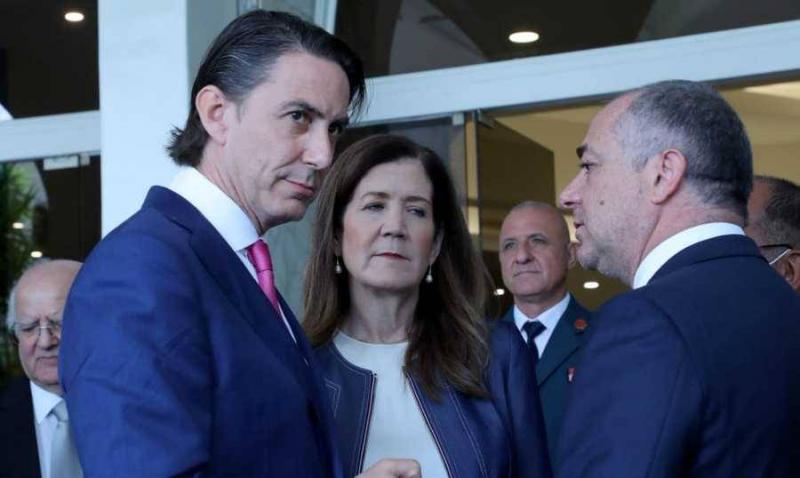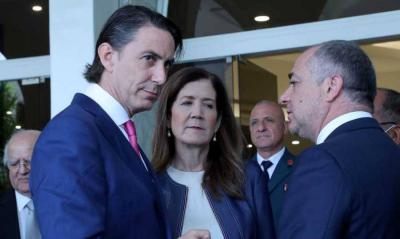Diplomatic and political sources revealed that it is a mistake to rely on the circulating scenarios regarding the fate of indirect negotiations for maritime border demarcation between Lebanon and Israel so far. It is preferable to wait for the return of the American envoy Amos Hochstein to Beirut to verify the series of leaks that do not bear official Israeli or American fingerprints before judging the future of his mission. These sources, speaking to "Al-Markaziyah," acknowledge that past experiences have taught us a lot about what should be considered, as the positions and leaks that preceded Hochstein's recent visit proved that the American envoy is in one context while the narratives are in another.
The search for the backgrounds of what is happening in Israel has taken on a new flavor due to internal developments, which compel the government to adopt a new strategic direction different from previous choices. It is fully preparing for parliamentary elections this coming fall with perspectives differing from those that former Prime Minister Benjamin Netanyahu decided to resort to. The sources stated that it is mistaken to think that there is currently a caretaker government in Israel; the government led by Yair Lapid is fully constitutionally valid following his assumption of power under a power-sharing agreement with Naftali Bennett during a period that coincided with the dissolution of the Knesset and the call for early elections.
Against this backdrop, diplomatic sources insist on being cautious in discussing a dramatic collapse of Hochstein's mission and prefer to maintain a high level of optimism regarding the possibility of implementing the roadmap he outlined upon his return to the negotiation stage after the arrival of the "Energean Power" production vessel at the Karish field. If applied, this surpasses the repercussions left by Hezbollah's drones and the maritime coordinates threatening the Karish platform. Recent Lebanese offers are open for discussion as they align with the proposals of the "facilitating mediator," which Israel cannot refuse under the current conditions, regardless of the internal circumstances influencing the current government’s orientations.
These sources acknowledge that the current Israeli government has succeeded in maintaining its unity and completing the constitutional transition between Lapid and Bennett in evident harmony, in the face of Netanyahu's attempts to return to the political arena in Israel. The various components of this government have succeeded in several tests to continue what they began based on a coalition grounded in the necessary majority in the Knesset after the failure of resignation projects aimed at toppling the government, which successfully led them into early elections.
Accordingly, diplomatic reports received in Beirut over the past few hours indicate that what happened in Gaza in recent hours was not a random event; all reports predicting military operations were issued just hours before their commencement due to the failure of negotiations to arrange a prisoner exchange between Palestinian factions in Gaza and Israel. Any project linking this to a potential escalation on Israel's northern border with Lebanon remains unlikely. Discussions emanating from Egyptian circles in recent hours regarding Hezbollah's potential involvement in military operations related to the situation in Gaza represent a lost proposal at this time, as multiple prohibitions prevent dragging Lebanon into this operation, which is deemed limited in timing, form, and content.
One of the urgent cables that "Al-Markaziyah" reviewed indicated that the Egyptian narratives about a potential northern front participation alongside what is happening in the "Gaza Envelope," and Hezbollah's involvement in the war are merely media scenarios accompanying the Egyptian mediation to halt the events in Gaza and coinciding with the arrival of high-level delegations to Gaza and Israel to arrange a ceasefire, apart from what is occurring in the northern part of the territorial waters of occupied Palestine and what accompanies the oil extraction project from the Karish field scheduled for marketing in early fall.
In light of these multiple indicators, involved sources agree on the necessity of allowing sufficient time for Hochstein to formulate his new proposals. The American motivations to expedite the conclusion of the demarcation agreement are not merely a tactical decision; they are central to the American strategy for the region, and calm is required at this stage. The outlook towards potential Iranian intervention in the demarcation negotiations has receded through the unified Lebanese stance before discussing other factors. Should Washington respond to this position, it would be the only way to mitigate the risks of what is unfolding in a region that cannot sustain any military operations of the magnitude of a confrontation between Hezbollah and Israel, which, if it occurs, could mark the beginning of a conflict whose outcome cannot be assessed amidst current international tensions. There is no indication from either party granting Hezbollah or Israel a signal or green light for such a gamble as of today.




